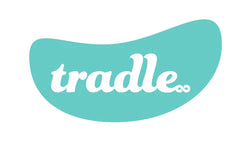Tradle’s mission is to help parents raise the first zero-waste generation so let’s get started with some commonly asked questions and simple solutions.
What does zero-waste mean?
Put most simply zero-waste is exactly as it sounds. It means producing zero garbage. However, the idea gets more complex if you think about the fact that trash production is baked into our economic systems. Just try and produce zero trash for one day and you’ll see what we mean.
So in order to implement zero waste on a large scale, we need to reimagine our economies and produce, consume and dispose of consumer goods in new ways. The zero-waste movement advocates establishing a circular economy that generates economic activity that’s not dependent on consumption, eliminates waste by keeping materials in constant use and regenerates natural systems.
Why should I join the Zero Waste movement?
Well, the answer is simple but also a little depressing. We’ll end on a hopeful note, so bear with us here.
We live in a disposable society where we don't value our belongings, and we're consuming way too much of everything. The average American sends 4.4 lbs of trash to the landfill every day and if you think that’s bad know that 70% of the trash in landfills is produced during manufacturing so we never even see it.
Landfills are in short supply and are toxic. Twenty percent of the methane emissions in the US are produced by landfills while toxins from cleaners, batteries, small electronics (and other items that shouldn't be there) leach into our soil and groundwater.
And then there’s plastic. The world is currently producing nearly 300 million tons of plastic annually most of which ends up either landfills or in natural environments, especially the oceans. About half of our plastic garbage is produced from needless single-use products and only about 9% of the world’s plastic is recycled.
Many aquatic animals think plastic is food and plastic particles have been found in 60% of seabirds and 100% of sea turtles. Animals who eat plastic often die from choking or toxicity. For humans, toxins from plastic are linked to cancer, birth defects, impaired immunity, respiratory and endocrine problems.
What can I do?
The good news is you can help by producing less garbage.
The best and easiest way to do this is to buy less stuff. One of the most rebellious and radical things you can do in our society is to find contentment with what you already have.
Talk about this with your family and think about how much fun it might be to attribute more of your household budget to experiences and less to stuff. You can also teach yourself and your kids to be intentional about what you buy. Post this list of questions on your fridge and discuss them with your family before every big purchase.
-
Do I need it?
-
Is it necessary?
-
Is it replacing something I can repair instead?
-
Do I need to own it or can I borrow it from a friend?
-
Can I find it second hand?
-
Can I buy it from a local business?
-
Who made it?
-
Will it last?
-
What will happen to it when I’m done with it?
-
Do I love it?
Then get creative about how you are your family can generate less trash and make it fun for your kids. Here are some ideas to get started.
-
Create and carry a zero-waste kit with a reusable straw, travel cup, leftover container, and reusable cutlery.
-
Shop in a farmers market or sign up for a vegetable box delivery.
-
Say no thank you to free promotional items.
-
Buy second-hand clothes and donate yours.
-
Support sharing economies like libraries.
-
Use Abeego Food natural beeswax food wrap.
-
Wear your clothes more times before you wash them.
-
Use organic wool dryer balls and Guppiefriend Washing Bags.
-
Bring reusable bags to the store (duh).
-
Organize a clothing swap with your friends.
If you want to dig deeper join a zero-waste challenge. The Going Zero Waste Blog is a fantastic resource for newbies and pros alike. The author (and well-know advocate) Kathyrn Kellog hosts this fun challenge.
Of course, you should tell your friends with children under two to join Tradle! We partner with clothing brands that share our commitment to zero waste. We refurbish returned clothing and circulate it to another family until it’s worn out (several babies later). When clothing is too worn to reuse we dispose of it responsibly.
And get involved in your community. If you live in Vancouver check out the city’s 2040 Zero-Waste Initiative or the Granville Island Zero Waste Island program. Or visit some zero-waste stores like Nada Grocery and the Soap Dispensary.
Whatever you do have fun. Remember it’s not about perfection (after all we live in a world designed to produce trash) but rather about making better choices. As Margaret Mead said, “Never doubt that a small group of thoughtful, committed citizens can change the world; indeed, it's the only thing that ever has.”

